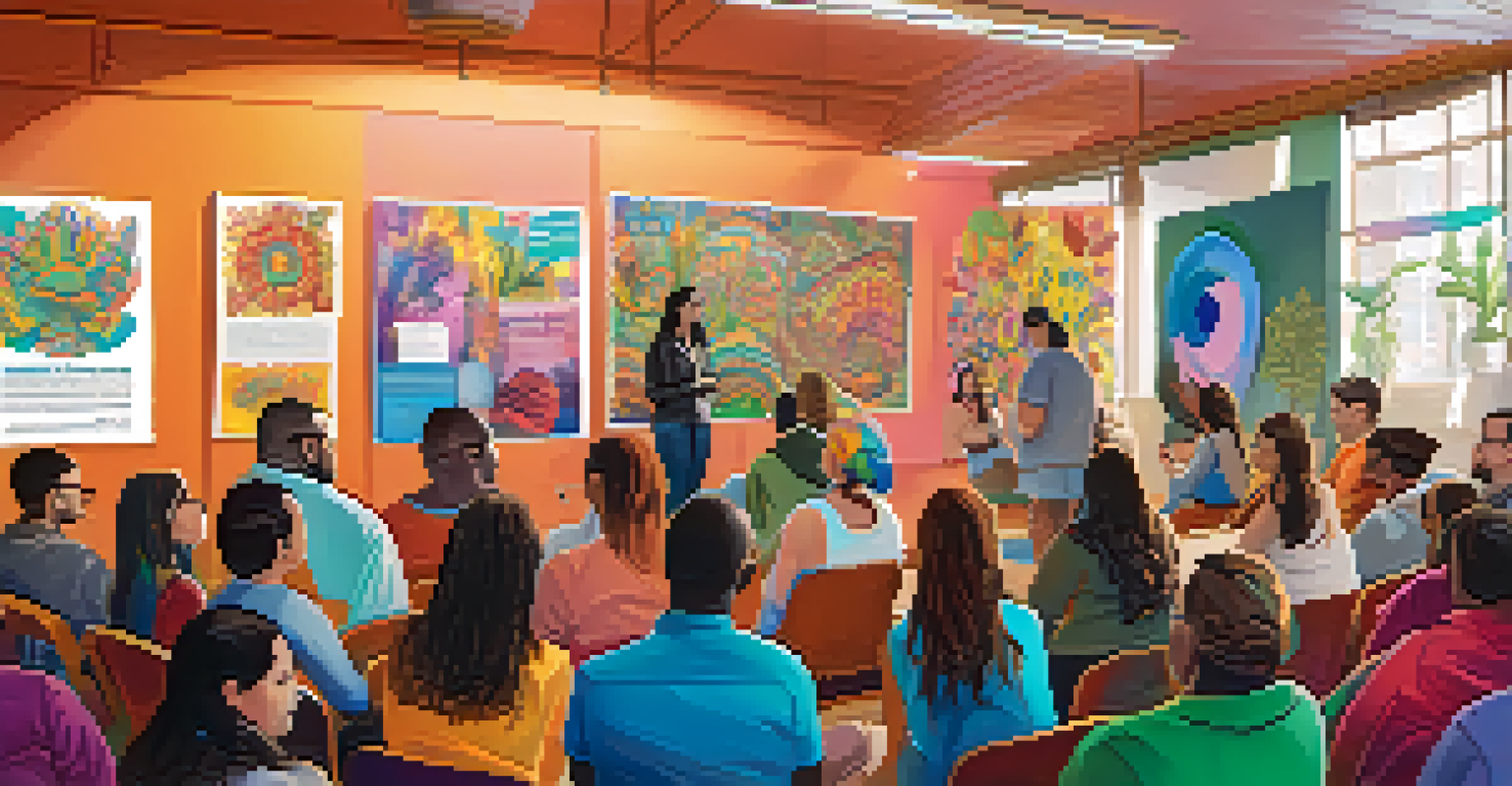Psychedelics in Therapy: Addressing Racial Disparities

Understanding Psychedelics and Their Therapeutic Potential
Psychedelics, such as psilocybin and LSD, have gained attention for their therapeutic potential in treating various mental health conditions. Research indicates these substances can facilitate profound emotional breakthroughs and foster new perspectives. This is particularly relevant in therapy, where traditional approaches may not resonate with everyone.
The greatest obstacle to discovering the truth is being convinced one already knows it.
In recent years, there has been a resurgence of interest in psychedelics within the medical community, especially in the context of mental health. Studies have shown promising results for conditions like depression, PTSD, and anxiety, suggesting that psychedelics can offer a unique approach to healing. As therapy evolves, these substances may play a pivotal role in supporting emotional well-being.
However, the healing power of psychedelics has not been equally accessible to all communities. Racial disparities in healthcare often lead to marginalized groups being overlooked in therapeutic settings, raising questions about equity and access to these innovative treatments.
Historical Context: Psychedelics and Racial Inequities
The historical context of psychedelics is deeply intertwined with issues of race and social justice. In the 1960s, psychedelics were associated with counterculture movements, which included many marginalized voices. Yet, the subsequent prohibition of these substances disproportionately impacted communities of color, reinforcing systemic inequities.

As the stigma surrounding psychedelics began to fade, recent studies have highlighted the need for inclusivity in research and treatment. The legacy of past injustices calls for a reevaluation of who benefits from psychedelic therapies. By understanding this context, we can better address the ongoing disparities in mental health treatment.
Psychedelics Aid Mental Health
Research shows psychedelics like psilocybin and LSD can effectively treat conditions such as depression and PTSD, offering new therapeutic avenues.
It’s crucial to acknowledge the voices of those who have historically been sidelined in discussions about mental health and psychedelics. This can help ensure that future therapeutic approaches are not only effective but also equitable and inclusive.
Current Research: Psychedelics in Therapy for Diverse Populations
Current research is beginning to explore how psychedelics can be effectively integrated into therapy for diverse populations, including people of color. Studies suggest that these substances can help individuals confront and process trauma, which is often compounded by racial discrimination. By fostering an environment of safety and understanding, therapists can help clients navigate their experiences.
In diversity there is beauty and there is strength.
For example, recent trials have included participants from various backgrounds to ensure that findings are applicable to a broader audience. This approach not only enhances the validity of the research but also empowers communities that have been historically marginalized in mental health discussions. It’s a step toward inclusivity, where everyone has an opportunity to heal.
Moreover, the insights gained from diverse populations can inform more culturally competent therapeutic practices. This is crucial for ensuring that the benefits of psychedelics are accessible and relevant to all, regardless of race or background.
Barriers to Accessing Psychedelic Therapies
Despite the promising potential of psychedelics in therapy, several barriers prevent equitable access for marginalized communities. Financial constraints, lack of insurance coverage, and limited availability of trained therapists can hinder individuals from seeking these treatments. Additionally, societal stigmas surrounding psychedelics can discourage people from exploring these options.
Access to clinical trials and research studies is also uneven, often favoring those with more resources or connections. This creates a disparity where individuals from lower socioeconomic backgrounds may miss out on groundbreaking therapies. Bridging this gap requires intentional efforts from the medical community and policymakers alike.
Addressing Racial Disparities
Historical and systemic inequities have hindered equitable access to psychedelic therapies, highlighting the need for inclusivity and cultural sensitivity in treatment.
Addressing these barriers is essential to create a more inclusive therapeutic landscape. By advocating for equitable access and providing educational resources, we can empower all individuals to explore the benefits of psychedelics in therapy.
Cultural Sensitivity in Psychedelic Therapy Approaches
Cultural sensitivity plays a vital role in the effective implementation of psychedelic therapies. Understanding the cultural backgrounds and experiences of clients can greatly enhance the therapeutic process. This approach fosters trust and rapport, which are essential for successful therapy outcomes.
Therapists must be aware of the unique challenges that clients from diverse backgrounds face, especially those related to race and systemic oppression. Tailoring therapeutic approaches to consider these factors can lead to more meaningful healing experiences. This highlights the importance of training therapists in cultural competence.
By incorporating cultural sensitivity into psychedelic therapy, practitioners can create a more inclusive environment. This not only benefits the individuals involved but also contributes to a broader understanding of how different cultures perceive and engage with mental health treatments.
Community Involvement: Building Trust in Psychedelic Therapy
Community involvement is crucial for building trust in the use of psychedelics in therapy, especially among marginalized populations. Engaging community leaders and organizations can help bridge the gap between traditional mental health practices and the emerging field of psychedelic therapy. This collaboration fosters a sense of ownership and empowerment within communities.
Workshops, informational sessions, and open dialogues about psychedelics can demystify these substances and their therapeutic potential. By providing accurate information and addressing misconceptions, communities can make informed decisions about their mental health. This grassroots approach encourages participation and acceptance.
Community Engagement is Essential
Building trust through community involvement and education about psychedelics can empower marginalized populations to explore these therapeutic options.
Moreover, involving communities in the research process ensures that their voices are heard and considered. This creates a more equitable framework for therapeutic practices, ultimately leading to better outcomes for everyone involved.
Future Directions: Ensuring Equity in Psychedelic Therapy
Looking ahead, ensuring equity in psychedelic therapy requires a multi-faceted approach. Policymakers, researchers, and practitioners must collaborate to create frameworks that prioritize inclusivity and access. This includes addressing systemic barriers and advocating for policies that support marginalized communities.
Education and training for therapists in cultural competence and equity should be a priority. By equipping professionals with the necessary tools and knowledge, we can enhance the therapeutic experience for diverse populations. This not only improves outcomes but also fosters a more compassionate healthcare system.

Ultimately, the future of psychedelic therapy should reflect the diverse society we live in. By committing to equitable practices, we can harness the healing potential of psychedelics for all individuals, regardless of their racial or cultural background.